高二英语-必修四综合复习
- 格式:doc
- 大小:131.47 KB
- 文档页数:14
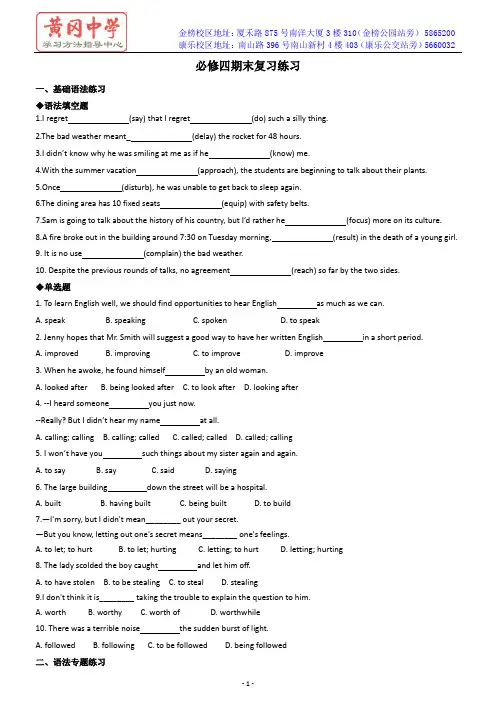
必修四期末复习练习一、基础语法练习◆语法填空题1.I regret (say) that I regret (do) such a silly thing.2.The bad weather meant_ (delay) the rocket for 48 hours.3.I didn’t know why he was smiling at me as if he (know) me.4.With the summer vacation (approach), the students are beginning to talk about their plants.5.Once (disturb), he was unable to get back to sleep again.6.The dining area has 10 fixed seats (equip) with safety belts.7.Sam is going to talk about the history of his country, but I’d rather he (focus) more on its culture.8.A fire broke out in the building around 7:30 on Tuesday morning, (result) in the death of a young girl.9. It is no use (complain) the bad weather.10. Despite the previous rounds of talks, no agreement (reach) so far by the two sides.◆单选题1. To learn English well, we should find opportunities to hear English as much as we can.A. speakB. speakingC. spokenD. to speak2. Jenny hopes that Mr. Smith will suggest a good way to have her written English in a short period.A. improvedB. improvingC. to improveD. improve3. When he awoke, he found himself by an old woman.A. looked afterB. being looked afterC. to look afterD. looking after4. --I heard someone you just now.--Really? But I didn’t hear my name at all.A. calling; callingB. calling; calledC. called; calledD. called; calling5. I won’t have you such things about my sister again and again.A. to sayB. sayC. saidD. saying6. The large building down the street will be a hospital.A. builtB. having builtC. being builtD. to build7.—I'm sorry, but I didn't mean________ out your secret.—But you know, letting out one's secret means________ one's feelings.A. to let; to hurtB. to let; hurtingC. letting; to hurtD. letting; hurting8. The lady scolded the boy caught and let him off.A. to have stolenB. to be stealingC. to stealD. stealing9.I don't think it is________ taking the trouble to explain the question to him.A. worthB. worthyC. worth ofD. worthwhile10. There was a terrible noise the sudden burst of light.A. followedB. followingC. to be followedD. being followed二、语法专题练习1.—Mike, what did our monitor say just now?—Every boy and every girl as well as teachers who________ to visit the museum________ asked to be at the school gate before 6:30 in the morning.A. is; isB. are; isC. is; areD. are; are2. It is I________ my parents who________ to blame for the accident.A. other than; areB. rather than; amC. more than; areD. than; is3. No freshman and no graduate________ to sit in on the forum.A. are allowedB. is allowedC. are agreedD. is agreed4. Professor Smith, along with his assistants, ________ on the project day and night to meet the deadline.A. workB. workingC. is workingD. are working5. About one third of the population in Beijing and Shanghai________ denizens, but in poorer areas, only three or four percent________ online.A. is; isB. are; areC. are; isD. is; are6. The theory he's stuck________ us that earthquake can be forecast.A. to provesB. to proveC. to provingD. to proved7. in the queue for half an hour, the old man suddenly realized he had left the cheque in the car.A. WaitingB. To waitC. Having waitedD. To have waited8. that he was in great danger, Eric walked deeper into the forest.A. Not realizedB. Not to realizeC. Not realizingD. Not to have realized9. When asked why he went there, he said he was sent there for a space flight.A. trainingB. being trainedC. to have trainedD. to be trained10. The flowers his friend gave him will die unless every day.A. wateredB. wateringC. waterD. to water11. all my homework, I went out to have a walk with my mother.A. FinishedB. Having finishedC. FinishingD. To finish12. , we’d better take her to hospital.A. Be illB. Being illC. Mother is illD. Mother being ill13. While around the city, we were deeply impressed by the city’s new look.A. takingB. being takenC. having takenD. have been taken14. an answer, she decided to write him another letter.A. Not receivingB. Not receivedC. Not having receivedD. Having not received15. Sunday, the students are at home.A. BeingB. To beC. It isD. It being16. With the bridge , the communication between the two cities will surely be strengthened.A. completedB. to be completedC. having completedD. completing17. and happy, Tony stood up and accepted the prize.A. SurprisingB. SurprisedC. Being surprisedD. To be surprising18. On each side of the street a lot of trees.A. standsB. standC. is standingD. are grown1.This is one of the most exciting theme parks that I (have) visited, and Lily is the only one of the cleverest students who (have) worked out the problem.2. A large amount of damage (be) done to the city in a very short time and large amounts of money(be) spent in rebuilding the city.3. Neither you nor I nor anybody else (know) anything about it.4. The farmer as well as his wife and children (be) very sad for their damaged crops.5. The peasant and scientist (have) produced a special strain of super hybrid rice.6. More than one person (have) seen the explosion.7. No one can escape (punish) by the law if he breaks the law.8. I want to tell my father that our computer needs (repair).9. The key to (solve) the problem is to meet the demand made by the customers.10. The discovery of the new evidence led to the thief (catch).11. The question (discuss) is abou t how to improve the workers’ working condition.12. In order to keep warm, we had the fire (burn) all night.13. The lost boy was last seen (play) near the bank of the river.14. When the day breaks, the soldiers found themselves (surround) by their enemies.15. The law requires that everyone (have) his car checked at least once a year.16. (stay) warm at night, I would fill the stove, then set my alarm clock for midnight so that I could refill it.17.The time and effort he has devoted during the past few years to (plant) trees in that remote area is considered to be of great value.18.The engine just won’t start. Something seems(go) wrong with it.19.With the police (direct) the traffic, we could get back home safely in such hazy weather.20. (expose) to sunlight for too much time will do harm to one’s skin.三、题型训练◆单句改错1.She treats the young girl as if she is her own daughter.2.With the days went by, things were getting worse and worse.3.You may find it astonished that Charlie was taught to sing as soon as he could speak.4.Tim had the lights burn all night along.5.I have never seen so a good teacher as her before.6.Weather permits, we will go out for an outing.7.Only by shouting he able to make himself heard.8. These eight planets, together with the sun, make up that is called our solar system.Have you heard of the word “hygge”? It’s a Danish word and a lifestyle of Danish people. There is n o English word 1._ ____the precise (精确的) meaning of “hygge”. It might2._ ____(translate) to coziness (舒适) in English, but it is more than that.Enjoying beautiful music or having a movie night 3._ ____ (be) hygge. Lighting candles or making real tea in china cups –that’s hygge too. There’s nothing more hygge than sitting around a table with your family or friends,4._ ____(discuss) the big and small things in life. Hygge focuses on5._ ____idea of making ordinary daily activities special, or meaningful.For Danish people, hygge is a way of fighting the cold winter, 6._ ____it doesn’t have to be a winter-only thing. In Denmark, there can be up to 17 hours of 7. _ ____(dark) per day in winter, and the average temperatures are around 0 C. As a result, people spend more time indoors and focus on entertaining 8. _ ____ (they) at home.Now the idea of hygge 9._ ____(expand) and becoming popular in some other countries too. In the United Kingdom and the United States, there are more and more hygge-themed cookbooks and lifestyle guides, as well as Danish restaurants, cafes and bars. The rest of the world seems to be slowly waking up to 10. _ ____Danes have been wise to for ages.◆短文改错Santa Claus is actually a real man called Saint Nicholas, that sounds very similar to Santa Claus. He was born about 2,000 years before, during the Roman Empire. He was a very kind priest (神父) who will travel the country to help people, giving gifts to people later at night. He did like to be seen giving gifts, so children were encouraged to go to sleep quickly. Nothing have changed today, with Santa Claus not visiting until all the childs are asleep. The US version of Santa Claus began when Dutch settlers arrived in there about 400 years ago. His name was original Sinter Klaas, but he was slowly changed to Santa Claus over the years.答案:一、基础语法练习◆语法填空题1.to stay, doing;2.delaying;3.had known;4.approaching;5.disturbed;6.equipped;7.focused;8.resulting;plaining; 10.has been reached;◆单选题1-10 CABBD CBDDB二、语法专题练习◆单选题1-10 BBBCB ACCDA 11-20 BDBCD BBB◆语法填空题1.have, has;2.was, were;3.knows;4.was;5.has;6.has;7.being punished;8.repairing;9. solving;10.being caught; 11.being discussed; 12.burning; 13.playing; 14.surrounded; 15.have; 16.To stay;17. planting; 18. to have gone; 19.directing; 20.Being exposed;三、题型训练◆单句改错1.is→was;2. went→going;3.astonished→astonishing;4.burn→burning;5. so→such;6. permit→permitting;7.he之前加was; 8. that→what;◆语法填空题1. with;2.be translated;3.is;4.discussing;5.the;6. although;7.darkness;8.themselves;9.is expanding;10.what;◆短文改错that→which, before→ago, will→would, later→late, did后加not, have→has, childs→children, there之前的in去掉, original→originally, he→it/ that;。
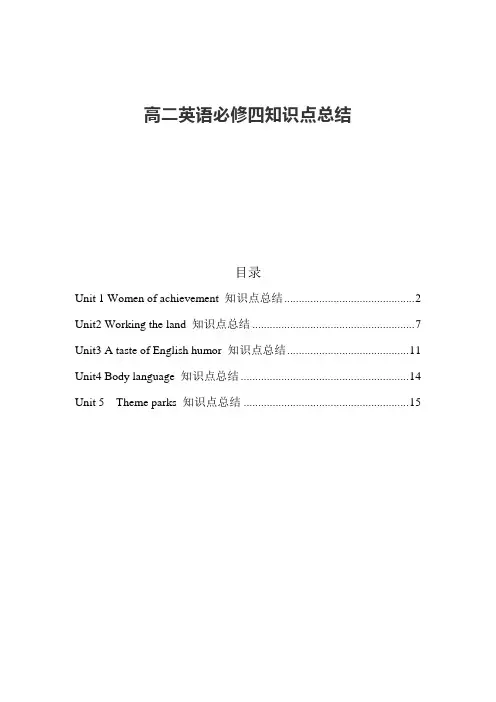
高二英语必修四知识点总结目录Unit 1 Women of achievement 知识点总结 (2)Unit2 Working the land 知识点总结 (7)Unit3 A taste of English humor 知识点总结 (11)Unit4 Body language 知识点总结 (14)Unit 5 Theme parks 知识点总结 (15)Unit 1 Women of achievement 知识点总结【重点词汇、短语】1. human beings 人类2. campaign 运动,战役3. behave 行为4. shade 阴凉处5. move off 离开,启程6. observe 观察7. respect 尊重8. argue 讨论,辩论9. lead a...life 过着…的生活10. crowd in 涌入脑海11. support 支持12. look down upon/on 看不起13. refer to 查阅,参考,涉及14. by chance 碰巧15. come across 偶遇16. intend 计划,打算17. deliver 提送,生(小孩),接生,发表(演说)18. carry on 继续,坚持【重点句型】1. She also discovered how chimps communicatewith each other and her study of their body language helped her work out theirsocial system.她还发现了黑猩猩之间是如何交流的,而她对黑猩猩身势语的研究帮助她弄清楚了黑猩猩的社会体系。
△ work out 解决、解答、计算出;产生结果、发展;锻炼;作出、制订出2. She is leading a busy life but she says …她过着忙碌的生活,但是她说……△ lead a …life = live a …life 过……的生活3. Many people look down upon poor people.很多人瞧不起穷人。
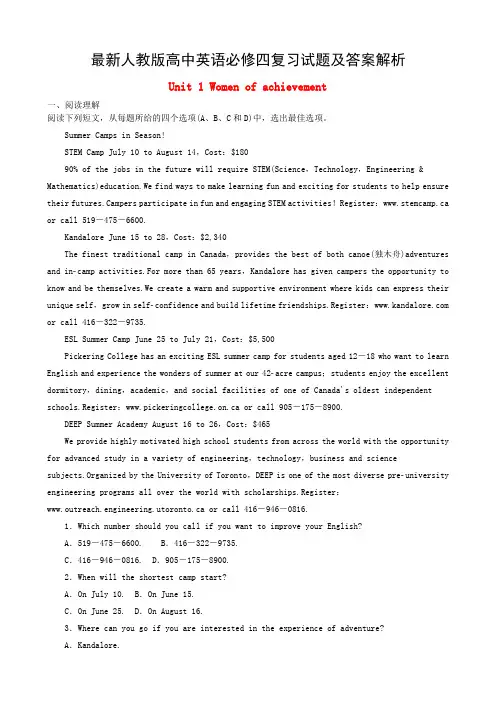
最新人教版高中英语必修四复习试题及答案解析Unit 1 Women of achievement一、阅读理解阅读下列短文,从每题所给的四个选项(A、B、C和D)中,选出最佳选项。
Summer Camps in Season!STEM Camp July 10 to August 14,Cost:$18090% of the jobs in the future will require STEM(Science,Technology,Engineering & Mathematics)education.We find ways to make learning fun and exciting for students to help ensure their futures.Campers participate in fun and engaging STEM activities!Register:www.stemcamp.ca or call 519-475-6600.Kandalore June 15 to 28,Cost:$2,340The finest traditional camp in Canada,provides the best of both canoe(独木舟)adventures and incamp activities.For more than 65 years,Kandalore has given campers the opportunity to know and be themselves.We create a warm and supportive environment where kids can express their unique self,grow in selfconfidence and build lifetime friendships.Register: or call 416-322-9735.ESL Summer Camp June 25 to July 21,Cost:$5,500Pickering College has an exciting ESL summer camp for students aged 12-18 who want to learn English and experience the wonders of summer at our 42acre campus;students enjoy the excellent dormitory,dining,academic,and social facilities of one of Canada's oldest independent schools.Register:www.pickeringcollege.on.ca or call 905-175-8900.DEEP Summer Academy August 16 to 26,Cost:$465We provide highly motivated high school students from across the world with the opportunity for advanced study in a variety of engineering,technology,business and scienceanized by the University of Toronto,DEEP is one of the most diverse preuniversity engineering programs all over the world with scholarships.Register:www.outreach.engineering.utoronto.ca or call 416-946-0816.1.Which number should you call if you want to improve your English?A.519-475-6600. B.416-322-9735.C.416-946-0816. D.905-175-8900.2.When will the shortest camp start?A.On July 10. B.On June 15.C.On June 25. D.On August 16.3.Where can you go if you are interested in the experience of adventure?A.Kandalore.B.STEM Camp.C.ESL Summer Camp.D.DEEP Summer Academy.4.How similar are STEM Camp and DEEP Summer Academy?A.They both offer scholarships for students.B.They provide the same courses for students.C.They both prepare students for their development.D.They are both designed for international students.【解题导语】本文是一篇应用文。
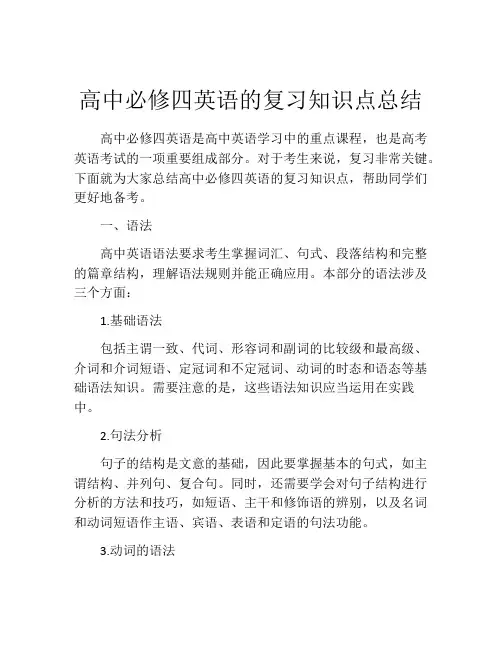
高中必修四英语的复习知识点总结高中必修四英语是高中英语学习中的重点课程,也是高考英语考试的一项重要组成部分。
对于考生来说,复习非常关键。
下面就为大家总结高中必修四英语的复习知识点,帮助同学们更好地备考。
一、语法高中英语语法要求考生掌握词汇、句式、段落结构和完整的篇章结构,理解语法规则并能正确应用。
本部分的语法涉及三个方面:1.基础语法包括主谓一致、代词、形容词和副词的比较级和最高级、介词和介词短语、定冠词和不定冠词、动词的时态和语态等基础语法知识。
需要注意的是,这些语法知识应当运用在实践中。
2.句法分析句子的结构是文意的基础,因此要掌握基本的句式,如主谓结构、并列句、复合句。
同时,还需要学会对句子结构进行分析的方法和技巧,如短语、主干和修饰语的辨别,以及名词和动词短语作主语、宾语、表语和定语的句法功能。
3.动词的语法动词是英语语法中的重点内容,包括时态、语态、虚拟语气和被动语态等。
要掌握动词不同时态的形式和用法,特别是了解时间、状态和动作等概念,以及不同时态的语义和句子含义。
二、词汇英语词汇是高考英语中必须掌握的基础知识,与语法和阅读理解有着密切的关系。
为复习英语词汇,需要注意以下几点:1.基础词汇要掌握英语中最基础的单词,如数字、时间、颜色、位置、量、质量、形状等,以及月份和星期几等常用词汇。
此外,还要熟记其他常用的英语词汇,如动词、形容词和副词等。
2.高级词汇英语中不少的高级词汇用法十分丰富,考生需要认真地阅读文本,了解上下文的含义。
包括学术词汇如理论、抽象、课程、研究等,文学词汇如旋律、描写、留恋等,以及常用的高级单词如准确、恰当、进一步、逐渐等。
3.词汇拓展词汇拓展主要是强化词汇之间的联系和应用。
复习时,可以根据词义来复习某个单词的同义词、反义词、形容词和副词等,还可以了解一些常用词组和惯用语。
三、阅读理解高中英语阅读理解是考生需要掌握的重点,需要掌握阅读和理解不同题干所提示的信息和主题。
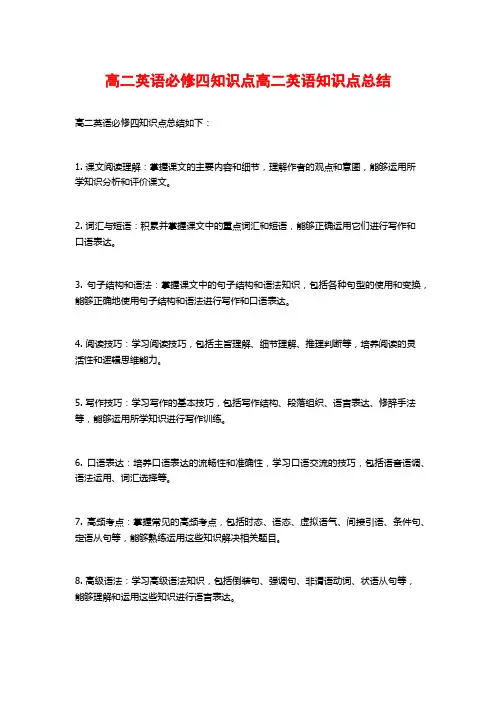
高二英语必修四知识点高二英语知识点总结
高二英语必修四知识点总结如下:
1. 课文阅读理解:掌握课文的主要内容和细节,理解作者的观点和意图,能够运用所
学知识分析和评价课文。
2. 词汇与短语:积累并掌握课文中的重点词汇和短语,能够正确运用它们进行写作和
口语表达。
3. 句子结构和语法:掌握课文中的句子结构和语法知识,包括各种句型的使用和变换,能够正确地使用句子结构和语法进行写作和口语表达。
4. 阅读技巧:学习阅读技巧,包括主旨理解、细节理解、推理判断等,培养阅读的灵
活性和逻辑思维能力。
5. 写作技巧:学习写作的基本技巧,包括写作结构、段落组织、语言表达、修辞手法等,能够运用所学知识进行写作训练。
6. 口语表达:培养口语表达的流畅性和准确性,学习口语交流的技巧,包括语音语调、语法运用、词汇选择等。
7. 高频考点:掌握常见的高频考点,包括时态、语态、虚拟语气、间接引语、条件句、定语从句等,能够熟练运用这些知识解决相关题目。
8. 高级语法:学习高级语法知识,包括倒装句、强调句、非谓语动词、状语从句等,
能够理解和运用这些知识进行语言表达。
9. 难点知识点:针对学生难以理解和掌握的知识点进行重点讲解和训练,帮助学生克服困难,提高成绩。
10. 阅读时态:理解和运用课文中的各种时态,包括一般现在时、一般过去时、一般将来时、现在进行时、过去进行时等,能够根据上下文选择合适的时态进行阅读。
以上是高二英语必修四的知识点总结,希望对你有所帮助。
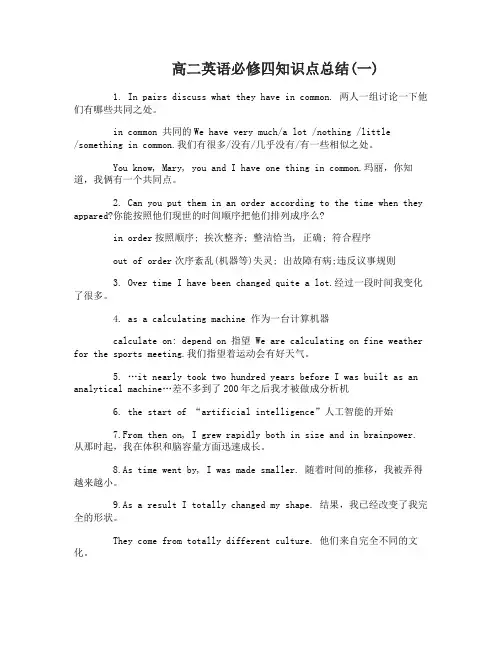
高二英语必修四知识点总结(一)1. In pairs discuss what they have in common. 两人一组讨论一下他们有哪些共同之处。
in common 共同的We have very much/a lot /nothing /little/something in common.我们有很多/没有/几乎没有/有一些相似之处。
You know, Mary, you and I have one thing in common.玛丽,你知道,我俩有一个共同点。
2. Can you put them in an order according to the time when they appared?你能按照他们现世的时间顺序把他们排列成序么?in order按照顺序; 挨次整齐; 整洁恰当, 正确; 符合程序out of order次序紊乱(机器等)失灵; 出故障有病;违反议事规则3. Over time I have been changed quite a lot.经过一段时间我变化了很多。
4. as a calculating machine 作为一台计算机器calculate on: depend on 指望 We are calculating on fine weather for the sports meeting.我们指望着运动会有好天气。
5. …it nearly took two hundred years before I was built as an analytical machine…差不多到了200年之后我才被做成分析机6. the start of “artificial intelligence”人工智能的开始7.From then on, I grew rapidly both in size and in brainpower. 从那时起,我在体积和脑容量方面迅速成长。
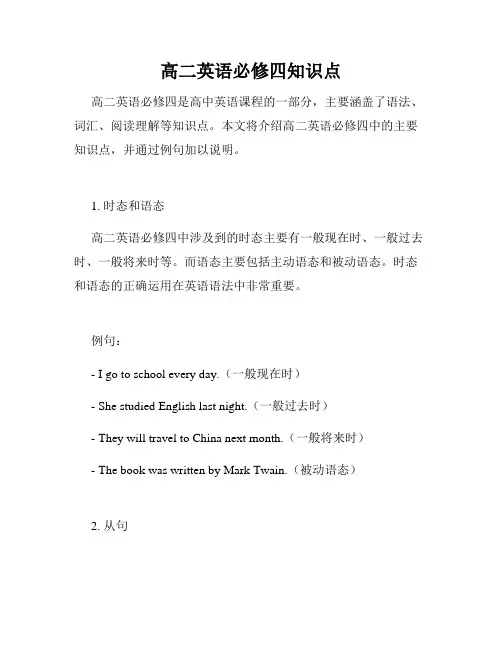
高二英语必修四知识点高二英语必修四是高中英语课程的一部分,主要涵盖了语法、词汇、阅读理解等知识点。
本文将介绍高二英语必修四中的主要知识点,并通过例句加以说明。
1. 时态和语态高二英语必修四中涉及到的时态主要有一般现在时、一般过去时、一般将来时等。
而语态主要包括主动语态和被动语态。
时态和语态的正确运用在英语语法中非常重要。
例句:- I go to school every day.(一般现在时)- She studied English last night.(一般过去时)- They will travel to China next month.(一般将来时)- The book was written by Mark Twain.(被动语态)2. 从句从句是高二英语必修四课程中的重点内容,常见的从句包括名词性从句、定语从句和状语从句。
它们在复合句中起到连接各个分句的作用。
例句:- I believe that he will pass the exam.(名词性从句)- The girl who is sitting over there is my sister.(定语从句)- He was singing while he was cooking.(状语从句)3. 动词的时态和语态动词的时态和语态是高二英语必修四中的核心知识点。
正确的时态和语态的运用可以有效地表达出动作发生的时间和方式。
例句:- She is working in a company now.(现在进行时)- The letter has been sent by him.(现在完成时的被动语态)- He had finished his homework before I arrived.(过去完成时)4. 词汇运用高二英语必修四课程涉及到丰富的词汇,并要求学生能够准确运用这些词汇进行写作和口语表达。
通过积累词汇量,可以更好地理解和运用英语。
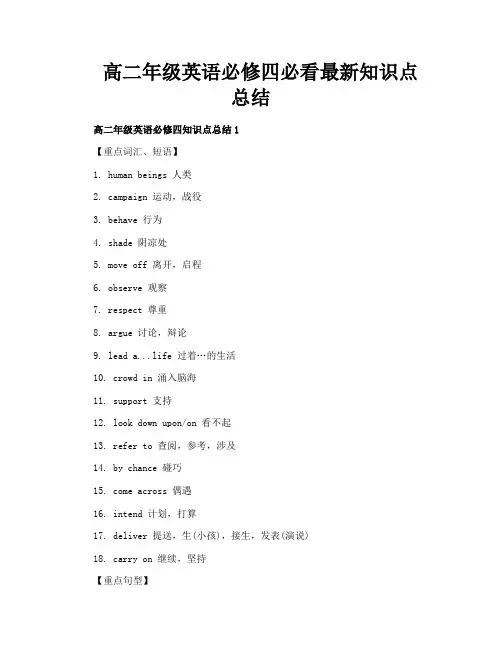
高二年级英语必修四必看最新知识点总结高二年级英语必修四知识点总结1【重点词汇、短语】1. human beings 人类2. campaign 运动,战役3. behave 行为4. shade 阴凉处5. move off 离开,启程6. observe 观察7. respect 尊重8. argue 讨论,辩论9. lead a...life 过着…的生活10. crowd in 涌入脑海11. support 支持12. look down upon/on 看不起13. refer to 查阅,参考,涉及14. by chance 碰巧15. come across 偶遇16. intend 计划,打算17. deliver 提送,生(小孩),接生,发表(演说)18. carry on 继续,坚持【重点句型】1. She also discovered how chimps communicate with each other and her study of theirbody language helped her work out their social system.她还发现了黑猩猩之间是如何交流的,而她对黑猩猩身势语的研究帮助她弄清楚了黑猩猩的社会体系。
△ work out 解决、解答、计算出;产生结果、发展;锻炼;作出、制订出2. She is leading a busy life but she says …她过着忙碌的生活,但是她说……△ lead a …life = live a …life 过……的生活3. Many people look down upon poor people. 很多人瞧不起穷人。
△ look down upon / on 蔑视;轻视;瞧不起You mustn’t look down upon/ on the disabled.你绝不能瞧不起残疾人。
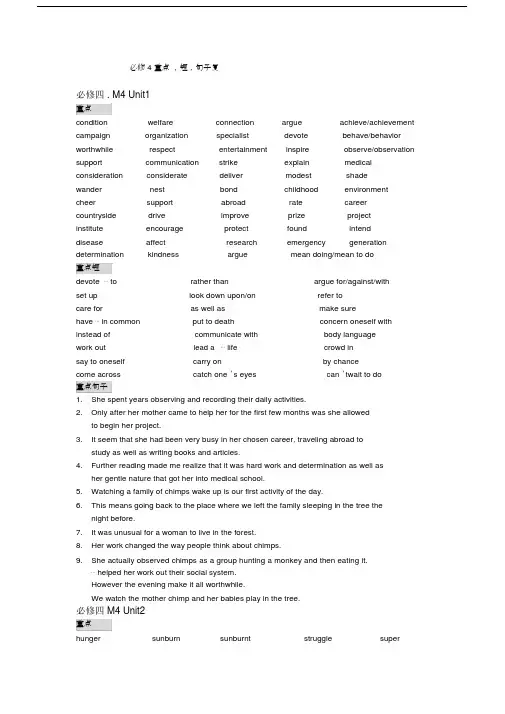
必修 4 重点,短,句子复必修四 . M4 Unit1重点condition welfare connection argue achieve/achievement campaign organization specialist devote behave/behavior worthwhile respect entertainment inspire observe/observation support communication strike explain medical consideration considerate deliver modest shadewander nest bond childhood environmentcheer support abroad rate career countryside drive improve prize projectinstitute encourage protect found intenddisease affect research emergency generation determination kindness argue mean doing/mean to do重点短devote ⋯ to rather than argue for/against/withset up look down upon/on refer tocare for as well as make surehave ⋯ in common put to death concern oneself with instead of communicate with body languagework out lead a ⋯ life crowd insay to oneself carry on by chancecome across catch one ’s eyes can ’twait to do重点句子1.She spent years observing and recording their daily activities.2.Only after her mother came to help her for the first few months was she allowedto begin her project.3.It seem that she had been very busy in her chosen career, traveling abroad tostudy as well as writing books and articles.4.Further reading made me realize that it was hard work and determination as well asher gentle nature that got her into medical school.5.Watching a family of chimps wake up is our first activity of the day.6.This means going back to the place where we left the family sleeping in the tree thenight before.7.It was unusual for a woman to live in the forest.8.Her work changed the way people think about chimps.9.She actually observed chimps as a group hunting a monkey and then eating it.⋯ helped her work out their social system.However the evening make it all worthwhile.We watch the mother chimp and her babies play in the tree.必修四 M4 Unit2重点hunger sunburn sunburnt struggle superproduct expand circulate equip freedom export suitable chemical confuse mineral reduce supply bacteria graduate agricultural whatever summary nutrition disturbing output hobby affect level awake dangerous farming harvest grain crop comfortable therefore underline decade production root statistics minerals discovery organic goal avoid comment fertile common重点短lead a ⋯ life with the hope of free frominsist on search for be satisfied withget/feel/be exhausted in addition focus onrid ⋯ of thanks to care aboutas well as lead to build up重点句子1.Dr Yuan Longping grows what is called super hybrid rice.2.The special strain of rice makes it possible to produce one-third more of the cropin the same field.3.Dr Yuan searched for a way to increase rice harvests without expanding the area ofthe fields.4. Dr Yuan is quite satisfied with his life.袁博士生活非常足。

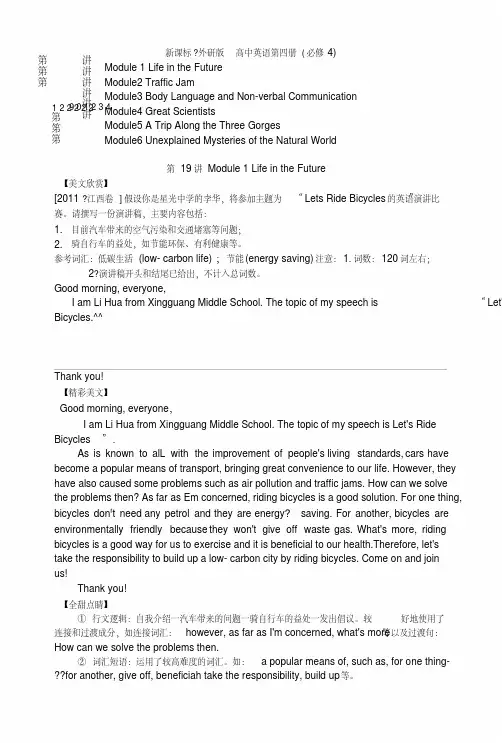
高中英语必修四复习提纲2023高中英语必修四复习提纲1重要词汇拓展welfaren福利事业,福利achievementn.成就,功绩→achievev.达到,完成,实现specialistn.专家,专业工作者→specialadj.特殊的,专门的→specializevi.专攻,专门从事projectn.方案,计划,,设计,工程,企业,事业,科研项目;课外自修项目vi.①伸出,突出②设想自已处身于(into)connectionn.连接,关系→connectv.连接conditionn.状况(不可数),条件(可数),环境(复数)onnocondition决不anizationn.组织,机构,团体organize—vt.组织;筹备,成立;使加入工会,使有条理8.behavev.举止,表现→behaviorn.行为,举止shaden.阴凉处v.遮住光线▲worthwhileadj.值得的,值得做的Itisworthwhiledoingsth./todosth.worthadj.值……,值得……beworthdoingworthyadj.值得做的,可尊敬的beworthyofsth/beingdonebeworthytobedoneobservev.观察,观测,遵守→observationn.观察,观测respectv./n.尊敬,尊重,敬意→respectableadj.值得尊敬的,正派的,体面地→respectfuladj.有礼貌的,恭敬的argue.v.争论,→argumentn.争论,辩论argued-adj引起争论的14.entertainment-n款待,娱乐entertain-v款待;招待,娱乐,抱有,怀着(想法、疑问)crowdn.人群,观众v.挤满,使拥挤→crowdedadj.拥挤的inspirev.鼓舞,激发→inspiredadj.受到鼓舞的,有灵感的→inspiringadj.鼓舞人的→inspirationn.鼓舞,灵感17supportv.支持,拥护→supportern.支持者,拥护者18.refer-vi谈到,查阅,参考19.intendv.计划,打算→intentionn.打算,目的,意图20.considerateadj.考虑周到的→considerv.考虑,认为→considerationn考虑,体谅→consideringprep考虑到kindadj仁慈的,和善的,友爱的kindness–n仁慈,好意,善良deliverv.递送,生(小孩),接生,发表(演讲等)→deliveryn.投递,交货,分娩23.modestadj谦虚的,谦让的,适度的高中英语必修四复习提纲2重点梳理1devote…to(doing)sth.把…奉献给devoteoneselfto致力于,献身于bedevotedto专心致志于2humanbeings人类3moveoff离开,启程,出发4leada…life过着……的生活crowdin涌上心头,涌入脑海lookdownon/upon蔑视,瞧不起referto查阅,参考,谈到(其中,to为介词)8bychance碰巧,凑巧carryon继续,坚持carryout实行,执行,完成bedressedin穿着…dressas打扮成…12.fightfor为….而战fightagainst与…战斗13.puttodeath判死刑14.concernoneselfwith…关注…注意…15.intendtodosth./doingsth.打算做某事16.intheshadeof在…的树荫下,在…的庇护下17.gaindoctor’sdegree获得博士学位beconsideredas被看做….taketurnstodosth采取步骤做某事20.doresearchon…做…方面的研究meantodo打算做某事meandoing意味着bynow直到现在高中英语必修四复习提纲3重点句型再现Shespentyearsobservingandrecordingtheirdailyactivities.她花去多年的时间观察和记录它们的日常活动。
1 高二一对一教学辅导教案 学科:英语 任课教师:金老师 时间: (星期6) 15:00 -17:00 姓名 年级 高二 性别 教学课题 必修4词汇,句型复习
Step1: Dictation Step2:Useful expressions: Unit1 Women of achievement知识点讲解重点词汇 1. achieve 【课文原句】She has achieved everything she wanted to do… (P3) achieve v. 意为―完成;达到‖,指经过长期努力而达到某目标、地位或标准等。其名词形式为achievement,意为―成就;功绩‖,a sense of achievement可指―成就感‖。如: He had finally achieved success. Even a small success gives you a sense of achievement. 2. condition 【课文原句】She helped improve prison conditions and gave prisoners work and education. (P1) condition 意为―环境;境况;条件‖时,是可数名词,常用复数形式conditions;意为―状态;状况‖时,是不可数名词,be in good condition表示―处于良好的状态‖,be out of condition表示―健康状况不佳‖。如: We should pay more attention to the poor living under the bad conditions. The astronauts soon got used to the condition of weightlessness. My car is old but in good condition. He is overweight and out of condition. 【知识拓展】condition意为―条件‖时,常用短语on condition that,表示―如果;在……条件下‖;在 3. devote 【课文原句】She devoted all her life to medical work for Chinese women and children. (P1) devote vt. 意为―投入于;献身‖,其宾语后常与介词to搭配,to后接名词、代词或动名词。devote … to … 意为―献身;致力于‖,指把自己、时间、精力等奉献给某种工作或事业。如: He has devoted his whole life to benefiting mankind. The girl, to whom he was devoted, died in a traffic accident by chance. After he has retired, he will devote himself to gardening. 4. behave 【课文原句】Jane has studied these animals for many years and helped people understand how much they behave like humans. (P2) behave vi & vt. 意为―举动;举止;行为表现‖,如behave well / badly等。其名词形式为behaviour,指―行为;态度;举止‖。如: The parents encouraged the children to behave well in front of the guests. My camera has been behaving well since it was repaired. Everyone praises the children's good behaviour. 5. worthwhile 【课文原句】But the evening makes it all worthwhile. (P2) worthwhile adj.意为―值得做的;值得出力的‖,可作表语或定语。be worthwhile to do / doing sth表示―值得做……‖,在动词-ing形式的结构中,worthwhile有时可以用来替代worth,特别是在表示―值得花时间‖这一概念时。如: I think teaching school is always a worthwhile job. The book referred to by the professor is worthwhile / worth reading. 6. observe 2
【课文原句】Jane spent many years observing and recording their daily activities. (P2) observe vt. 意为―观察;观测;遵守‖,可用observe sb do sth,observe + that从句。其名词形式为observation。如: I observed the man who murdered the boy enter the shop. He observed that we should probably have rain. Most information was collected by direct observation of the animals’ behaviour. 7. argue 【课文原句】She has argued for them to be left in the wild and not used for entertainment or advertisements. (P2) argue作动词时,意为―争论;争吵;争辩‖。argue for意为―为……辩护‖;argue with sb about / over sth指―就某事和某人争论‖;argue against意为―据理反对;争辩……‖。如: It is no use arguing for the plan because it has been rejected. We are always arguing with each other about money. Father argued fiercely against any increase in expenditure for the children’s annual party. 【知识拓展】argue的名词形式为argument,意为―争论;争端;论证‖,常构成短语settle an argument指―解决争端‖。 9. care for 【课文原句】It was a small book explaining how to cut the death rate from having and caring for babies by following some rules for keeping babies clean and healthy. (P6) care for可以表示look after的意思,意为―照顾;照料‖,且较正式;也可表示―喜欢‖的意思。如: His son cared for him when he was ill. In fact, I don’t really care for basketball. 另外,在上面的句子中,explain意为―解释,说明‖,后可接名词、代词、从句或wh + to do作宾语,可用explain sth to sb或explain to sb sth。如: Will you explain to us how we can finish the work as soon as possible? 【知识拓展】care about意为―介意;在乎‖,表示是否认为某事是重要的,某事是否引起了某人的兴趣或使其忧虑。最常用于疑问句或否定句中。about用在宾语前面,但是在连词前面一般省掉。 I don’t care about your opinion. I don’t care whether it rains — I’m happy. 10. intend 【课文原句】I looked carefully at the text and realised that it was intended for women who lived in the countryside. (P6) intend v. 意为―打算;计划;想要‖。intend to do sth意为―想干某事‖;intend后也可以接动词-ing形式或that从句。intend for表示―原打算给某人;准备让……干……‖。如: I intended to come to your house last night but it rained. I intend coming / to come back soon. He hadn’t really intended that they should be there. This gift is intended for you.热点语法
Unit 2 Working the land 知识点讲解 1. be satisfied (with): 1) Jane isn't quite satisfied with the way the barber cut her hair. 2) If you are not completely satisfied, you can get your money back. 3) I am not really satisfied with the job you did. 2. refer to : a) mention or speak about someone or something b) to look at a hook map, piece of paper, etc, for information 1)We agreed never to refer to the matter again. 2) Although she didn't mention any names, everyone knew who she was referring to. 3) He gave the speech without referring to his notes even once. 3. would rather: